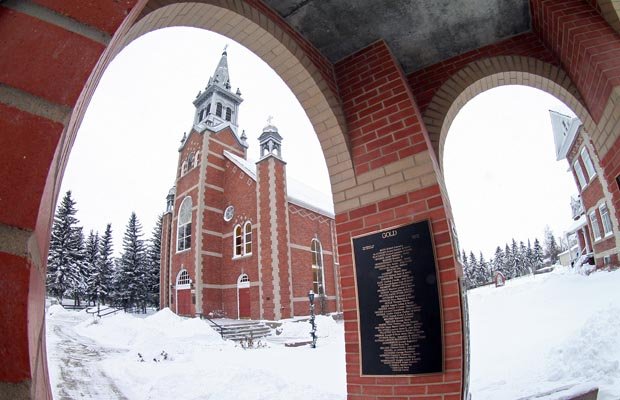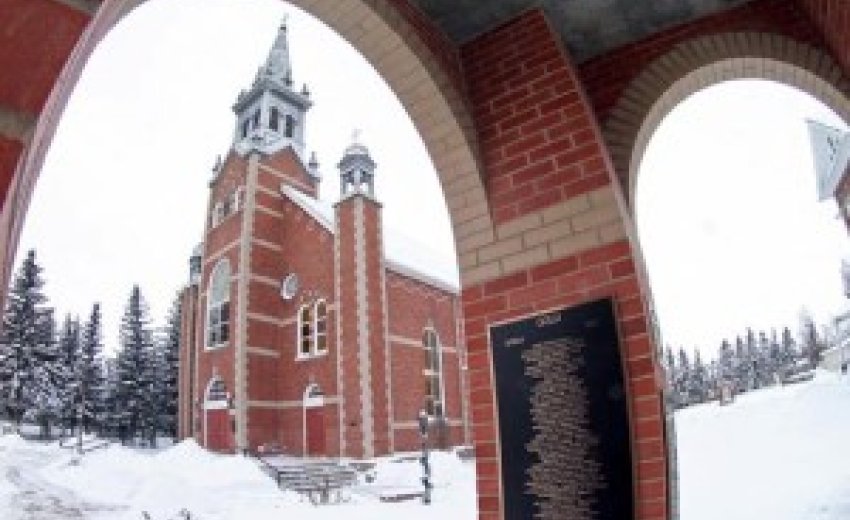 |
| Residents moving to town have made Morinville's population less Catholic than it was in the past. A group of parents in Morinville would like a non-faith-based education for their children.Photograph by: John Lucas, edmontonjournal.com |
March 8, 2011, EDMONTON - St. Albert is the oldest community in Alberta, a community with deep Roman Catholic roots, founded in 1861 by missionary Father Albert Lacombe.
Because of that unique history, St. Albert's "public" school board is Catholic - while its "separate" school board is nominally Protestant.
In St. Albert itself, that historic anomaly doesn't create major problems, since non-Catholic parents, or parents who don't want a Catholic education, can always send their kids to the fully funded separate school board.
But in the community of Morinville, just north of St. Albert, it's a different situation.
Morinville's four schools are all operated by the Greater St. Albert Catholic regional school division. Parents have no choice but to send their children to a Catholic school, even if they're Protestant, Muslim, Hindu, Jewish, Sikh or atheist.
That situation may have been tenable in the past, when Morinville was a majority Roman Catholic town. But today, Morinville is a fast-growing suburb with a diverse range of residents.
According to the school board, only 30 per cent of kids who go to school in Morinville identify themselves as Catholic. That means 70 per cent of the students in the community, a significant majority, are compelled to go to a Catholic school even though they are non-Catholics.
The school division does allow children to be exempted from formal religion classes, but nonetheless, Catholicism necessarily pervades the curriculum and the ethos of the school.
It's a logical absurdity, a vestigial relic that makes no sense in the Alberta of 2011. The real surprise is that it's taken this long for frustrated parents in the community to complain about their Hobson's choice.
The right of Roman Catholics to run their own schools is as old as Canada itself, an integral part of the French-English compromise that led to Confederation.
The protection of denominational schools was written into the British North America Act of 1867, reiterated in the Alberta Act of 1905 and safeguarded in the Constitution of 1982.
But those laws were about guaranteeing choice and protecting religious freedoms, about providing families with equal access to education that aligned with their cultural and spiritual values.
What's happening in Morinville now is a perversion of those very principles. The system isn't providing more choice. It's taking choice away. It isn't protecting religious rights and freedoms. It's denying them.
Other communities have faced similar situations and come up with more flexible solutions.
The St. Paul school division, north of Edmonton, is a great example of creative multiculturalism. Like St. Albert, St. Paul was founded as a Catholic mission. But when the province amalgamated rural school divisions in 1995, local parents decided they'd rather amalgamate their Catholic and public systems than join divisions further away. Five school divisions, some Catholic, some not, merged into one, with one superintendent and one board of trustees. The division runs both Catholic and public schools, as well as two Hutterite schools and a Mennonite one, with approximately onequarter of its students attending a Catholic school.
Beaumont, just south of Edmonton, was also founded as a Catholic, francophone community. For years, the Black Gold public school board ran the Beaumont schools, but invited in Catholic priests, nuns and teachers to run catechism and confirmation classes and hold religious services.
That compromise worked for years, until 2006, when Roman Catholic residents voted to establish a separate Catholic school in the booming bedroom community.
Yet despite the vote, most Catholic parents kept their kids in the public system. Today, there are only 70 Beaumont students, from kindergarten to Grade 2, who attend Catholic school in a temporary space operated by the Leduc-based St. Thomas Aquinas school division. The two school divisions, Black Gold and St. Thomas Aquinas, are now working together on plans for a new joint-use school, a shared facility for students from grades K-9.
The irony? Catholics in Beaumont were able to win their own separate school board because they were a minority religious group. According to Alberta Education, parents seeking secular education in Morinville don't have that right.
Separate boards can only be religiously based -and they can only be established for minority communities. In a ridiculous Catch-22, if a majority of parents in Morinville want a secular public school they have no legal mechanism to get one -because they're not a religious minority.
By failing to acknowledge and respond to the changing demographics of Morinville, the Greater St. Albert Catholic Regional Division isn't just discriminating against Morinville's children.
The division's uncharitable position undermines the premise of Catholic education itself. The longer the school division refuses to offer a workable compromise, the more Albertans may start to question the raison d'être for maintaining separate Catholic school boards all across the province.
There has to be a sensible way of honoring Alberta's francophone and Métis roots and respecting the autonomy of Catholic school boards, without forcing kids in Morinville to attend schools that violate their basic human rights. If the parents and the board can't find that compromise, it's time for Education Minister Dave Hancock to step in to find that answer.
© Copyright (c) The Edmonton Journal
